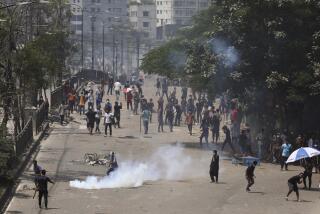A Roar, Blast Bring Death to Serb Family
Alexander Milic’s three-story brick house resembled a fortress.
So when the air-raid siren went off Tuesday, people in the neighborhood quickly converged in his basement. Covered by a slab of steel-reinforced concrete about a yard thick, it was reputed to be the best bomb shelter in town.
It was to become their tomb.
A bomb from a NATO warplane slammed through the house and into the shelter, killing Milic, four members of his family and as many as 10 neighbors, survivors of the attack said Wednesday.
Cleaning up after at least two blasts, residents of this prosperous southern town in Yugoslavia’s dominant republic, Serbia, stood in awe at the wreckage of Milic’s chalet-style home--a monument to the vulnerability that many Serbian civilians feel after more than five weeks under attack from the skies.
They recalled a horrifying sequence: A roar. A trembling of the earth. An explosion of brick and mortar and glass. A blinding cloud of dust. Dead silence. Then screams.
“Stones flew everywhere,” said Divina Kostic, 56, who lives around the corner in one of dozens of homes damaged in the attack, which Yugoslav officials said killed at least 16 people and severely wounded 12 others in a town of 15,000.
NATO spokesman Jamie Shea in Brussels said one of NATO’s laser-guided bombs veered off course from its intended target, a Yugoslav army barracks, and hit a civilian neighborhood. Pentagon spokesman Kenneth H. Bacon said the bomb was dropped by a U.S. F-15E Eagle aircraft and that clouds or smoke could have interfered with the laser-guidance system.
But people here insist that the sky was clear and that many explosions were heard in and around the town between noon and 12:45 p.m. Some recalled seven blasts; others counted eight, 10 or 11.
And whatever fell on Milic’s house may not have been a guided weapon but a “dumb” bomb, so called because it simply falls unguided to the target. Amid the rubble lay a cream-colored, fin-like fragment marked BSU-59/B.
John Pike, a military analyst with the Federation of American Scientists in Washington, said BSU stands for “bomb stabilization unit,” a feature unique to unguided bombs that cuts wind resistance to help them fall more quickly.
NATO is trying to force Yugoslav President Slobodan Milosevic to accept autonomy for the ethnic Albanian majority in Kosovo, a province of Serbia. Since the bombing campaign began March 24, reporters have not been free to travel on their own in much of Yugoslavia. Army escorts led journalists to Surdulica, 175 miles southeast of Belgrade, to hear officials press their claim that NATO is deliberately targeting civilians.
During a two-hour stay in the town Wednesday, journalists were allowed to visit two sites--both of them civilian neighborhoods--hit by airstrikes. They were not shown bodies, although reporters who arrived Tuesday night did see some.
There was no official list of dead. Some bodies had been torn apart, officials explained, making it hard to count them and identify the victims.
But it was obvious that the bombing had inflicted a terrible tragedy here.
Seated on a fallen concrete beam amid the wreckage, a man in a black leather jacket and brown cap bent forward. Elbow on knee, he cradled his head in one hand and stared at the ground.
He looked up, blinking bloodshot eyes. A blond woman touched his shoulder and whispered in his ear. Then she asked approaching reporters to leave the man alone.
It was Vojislav Milic, 64, grieving patriarch of the lost family that neighbors described as honest and hard-working.
Alexander Milic, who built the family home a few years ago with money saved working at an automobile-components factory, was his son. Neighbors say Alexander, 37, died along with his 60-year-old mother, Stamenka; his wife, Vesna, 35; their daughter, Miljana, 15; and son, Vladimir, 11.
Officials said at least six children, including a 3-year-old girl, were among the dead.
Some townspeople were agitated at the sight of U.S. journalists. “Publish everything you see here so all America knows what happened,” shouted Momcilo Kostic, who accosted several reporters. “Tell them we want peace. We are fair people.”
Surdulica’s population is about 70% Serb, and most of the rest are ethnic Bulgarian. Flanked on two sides by verdant hills, it is made up of tidy neighborhoods of multilevel homes with trim lawns, flower gardens and satellite dishes. The town would not look out of place in far wealthier countries such as Germany or Switzerland.
Air-raid sirens have wailed here nearly every day this month. Townspeople said missiles or bombs that fell on an army barracks here April 6 came in with a whistling noise.
Tuesday’s strike was different, they said.
“It felt like an earthquake and sounded like a 747 jet taking off,” said Zoran Savic, 25, a telecommunications engineer who moved back home after graduating from Georgia Tech University two years ago.
“There was so much dust I could barely see,” said Momir Andjelkovic, 38, who hid in his basement.
Following the sound of screams, he found his uncle, Stojance Radkovic, 65, in the rubble of the Milic house and helped rescue workers pull him out. He was the only known survivor in the Milic basement, Andjelkovic said.
Another bomb or missile hit in a different neighborhood, leaving a 20-foot crater where Radica Ristic’s three-story house once stood.
Spared because she took refuge in someone else’s shelter, Ristic, a retired teacher in her 60s, stood on the lip of the crater Wednesday, clutching the sleeves of her green sweater and screaming to anyone who would listen.
“Three arrows hit my house!” she said, referring to rockets or bombs. “I built it with 10 years of effort. I’m not guilty of anything. Why me?”
(BEGIN TEXT OF INFOBOX / INFOGRAPHIC)
Civilian Casualties
Instances of unintended “collateral damage” in NATO’s air campaign against Yugoslavia, now in its sixth week:
April 5: A bomb goes astray in the mining town of Aleksinac, killing 17 civilians.
April 12: A missile fired at a railroad bridge in southeastern Yugoslavia strikes a passenger train. Local media report 27 deaths, though only eight victims are identified.
April 14: As many as 75 ethnic Albanian refugees headed for the Macedonian border are killed when NATO planes three miles overhead mistake the convoy of trucks and wagons for military vehicles.
April 23: Airstrikes against Radio and Television Serbia demolish the chief source of propaganda in Yugoslavia, but 16 employees die in the attack.
April 27: A laser-guided bomb falls short of its military training base target in Surdulica, blasting civilian houses and killing as many as 20 people.
Source: Times staff reports
More to Read
Sign up for Essential California
The most important California stories and recommendations in your inbox every morning.
You may occasionally receive promotional content from the Los Angeles Times.






